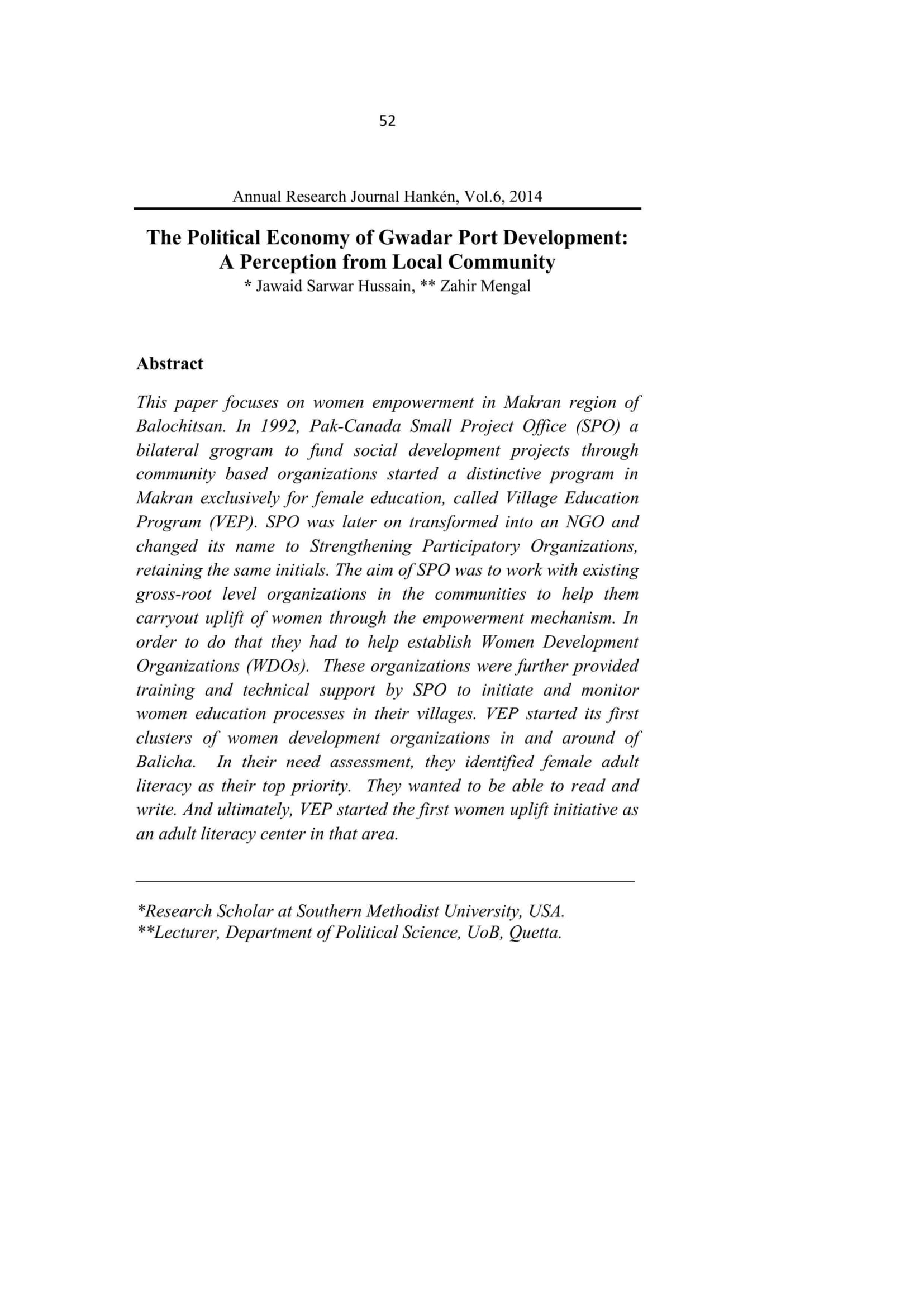The Empowerment of Baloch Women: a Makrani Perspective
Keywords:
Makran, Organizations, KechAbstract
This paper focuses on women empowerment in Makran region of Balochitsan. In 1992, Pak-Canada Small Project Office (SPO) a bilateral grogram to fund social development projects through community based organizations started a distinctive program in Makran exclusively for female education, called Village Education Program (VEP). SPO was later on transformed into an NGO and changed its name to Strengthening Participatory Organizations, retaining the same initials. The aim of SPO was to work with existing gross-root level organizations in the communities to help them carryout uplift of women through the empowerment mechanism. In order to do that they had to help establish Women Development Organizations (WDOs). These organizations were further provided training and technical support by SPO to initiate and monitor women education processes in their villages. VEP started its first clusters of women development organizations in and around of Balicha. In their need assessment, they identified female adult literacy as their top priority. They wanted to be able to read and write. And ultimately, VEP started the first women uplift initiative as an adult literacy center in that area.
The female of the Balicha area took the control in their own hand. They helped establish many community girls schools in the area by providing land for the school and also took the responsibility of monitoring the schools—to see whether the teacher is coming and/or the children are attending schools. This gave them the sense of ownership, being in-charge of their own affairs, and they carried out this responsibility with great commitment and devotion. After successful implementation and on-going maintenance, the same process was replicated in other areas of Kech.
Once the Women Development Organizations were established throughout the area, in order to eliminate duplication and perpetually support other development actors in the area for the benefit of the rural communities, the author came up with the blueprint of this project. This project networks community-based organizations, NGOs, GO, and International Development Agencies to share information and to collaborate with each other to save time and resources through utilization of available local human and other resources. This project was implemented by Makran Resource Center (MRC) located at Turbat-Kech. Women empowerment leads to economic and social empowerment and this project will prepare and strengthen Baloch women leaders for a brighter tomorrow.
References
Badawi, J. & Beekun, R. (1999). The leadership Process in Islam. The Islamic Training Foundation, 20
Badawi, J. (1971). The Status of Women in Islam. Al-Ittihad, 8 (2),
Bangash, Z. (2000). The concept of leadership in Islam. Crescent International, August 16-31
Bordas, J. (1992). Follow The Leader: Women Ways of Mentoring. (unknown): National
National Hispanic Leadership Institute.
Commins, S. (1993). Participation: From nice talk to actual practice. Together. 3-4.
Daloz, L. A. (1999). Mentor. San Francisco: Jossey-Bass Publisher.
Editor, The. (1993). True participation brings great empowerment. Together. 1.
Holy Quran, The.
Irvine, G. (1993). Who owns development. Together. 2.
Joha, G. & Fatima, K. (2000). Women Leadership course concludes Insights from different countries. Star, June 22
Makran Resource Center (1998). Brochure. Turbat
Murray, M. & Owen, M. A. (1992). Beyond the Myth and Magic of Mentoring.
San Francisco: Jossey-Bass Publishers.
Parks, D. P. (1992). The University as a Mentoring Environment. Indianapolis: Indiana
Office for Campus Ministries.
Profile of District Kech,The. (2001). Quetta: Planning and Development Dept.
Stanly, P. D. (1992). Connecting. Colorado Spring: Nav Press.
Naz, S. (2003). The status of female education in rural Balochistan. Impact: Making a
difference, 290-297. Available at: http://ecommons.aku.edu/book_chapters/48


